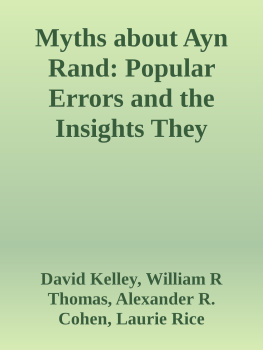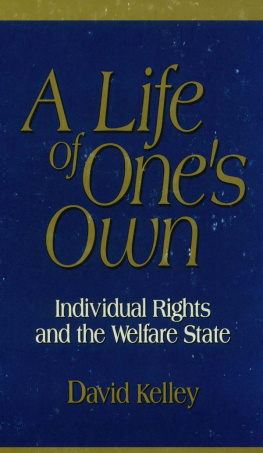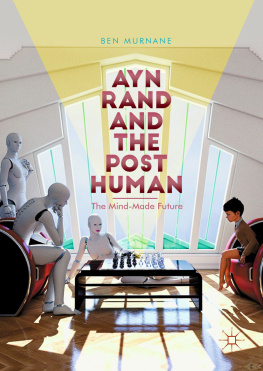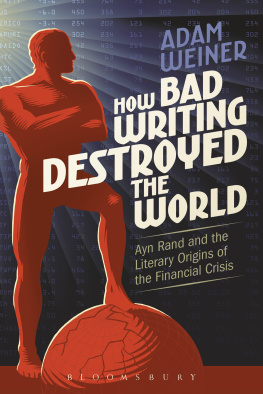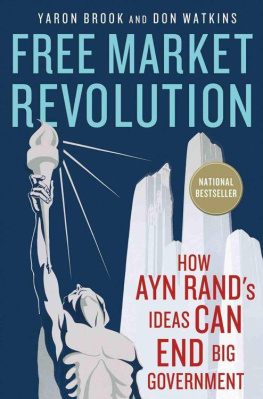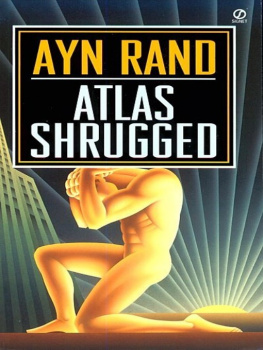Myths about Ayn Rand
Popular Errors and the Insights
They Conceal
Essays by
David Kelley
William R Thomas
Alexander R. Cohen
Laurie Rice
Edited by
Alexander R. Cohen
The Atlas Society
The Atlas Society is a nonprofit organization developing and promoting open Objectivism: Ayn Rands philosophy of reason, achievement, individualism, and freedom.
2013 The Atlas Society. All rights reserved. No part of this book may be reproduced or transmitted in any form or by any means, electronic or mechanical, including photocopy, recording, or any information storage and retrieval system, without prior permission in writing from The Atlas Society.
Information about other books and materials concerning Ayn Rand and her philosophy of Objectivism may be obtained by visiting our website, www.atlassociety.org.
The Atlas Society
P.O. Box 7601
#94614
Washington, D.C. 20044
1-800-374-1776
Email:
For more information, visit www.atlassociety.org
Contents
Introduction
The Real Ideas of Ayn Rand by Laurie Rice
Facts and Fiction
Misunderstanding was a major theme within Ayn Rands work. The heroes of her novels were often misjudged in their relationships with other characters and in the larger scope of their fictional societies. In Atlas Shrugged, misunderstanding becomes so problematic that the heroes of the novel withdraw, in part to illustrate their true nature to others. Like the heroes of her novels, Ayn Rands ideas are often misjudged and misrepresented in public discourse.
Many of the people responsible for the misunderstanding of Rands ideas are journalists. Their misunderstandings appear in a range of work, from artistic commentary about her fiction, to opinion pieces about her politics, to arguments about her philosophy. In some cases, mistakes seem based in ignorance; in others, it seems that journalists worldviews prevent them from portraying Rands ideas accurately.
While there may be room for interpretation of art forms such as novels and movies, the interpretations must still be supported by evidence. One may disagree about the truth of an idea in a novel such as Atlas Shrugged, or argue that it will have unforeseen consequences, but first one must state the actual idea. For journalists, this is a matter of professionalism as well as intellectual integrity: just as it is unprofessional for a journalist to misquote an interviewee, fudge a number, or say that an event happened on Wednesday if it actually happened on Thursday, it is equally unprofessional for a journalist to describe Ayn Rands philosophy as something it is not.
And yet, this is exactly what many writers, critics, and journalists have done. From Whittaker Chambers, the reviewer of Atlas Shrugged (the novel), who in 1957 claimed that Rand plumps for a technocratic elite, to Roger Ebert, reviewing Atlas Shrugged Part 1 on April 14, 2011, who said that Rands philosophy reduces itself to: Im on board; pull up the lifeline, reviewers have chronically misrepresented Rand. (As you will see, Rand is clearly not an elitist, nor does she advocate a cruel conception of self-interest.)
No Excuses
Unlike many philosophers, Ayn Rand is a household name. Her bestselling novels are available online and in book stores. There are numerous resources for Rands ideas, including The Atlas Societys website. Rands own essays are widely accessible and include definitions of most of her key terms. There is a growing library of Rand scholarship and analysis. Anyone with a particular question regarding Rand is welcome to submit it to The Atlas Society. In short, there is no longer any excuse for writing inaccurately about Rands basic ideas. Any journalist who continues to misrepresent Objectivism is at worst purposefully deceiving his audience; at best, displaying poor research skills. The myths presented here are basic categories of misrepresentation in writing about Rand.
Get Rand Right
David Kelley and William R Thomas originally wrote the five Myths essays to hold journalists accountable for their misrepresentations of Rands ideas. Now, The Atlas Society presents this electronic edition in order to combat those misrepresentations.
To writers seeking to criticize Ayn Rand, Atlas Shrugged, the movie, or the philosophy of Objectivism, we encourage you to portray the ideas accurately. If you value your argument, you do it a disservice by misrepresenting its opponent. We maintain hope that truth and honesty are still a priority in the media.
And to readers who have dismissed Rand on the basis of the myths, we encourage you to consider the facts presented here. We have found extraordinary value in Rands ideas, and with the myths cleared out of the way, we hope you will too. For those who wish to learn more about Ayn Rand and Objectivism, we have suggested some resources at the end of this volume, and we encourage you to get in touch with The Atlas Society.
Myth #1
Ayn Rand was an Elitist by David Kelley
The heroes of Ayn Rands fiction are great achievers, like Howard Roark, the superlative architect in The Fountainhead, and John Galt, the brilliant physicist-philosopher in Atlas Shrugged. Moreover, Galt is a revolutionary advocate for achievers: he leads a strike of the most productive people by convincing them to shrug off the burdens society has placed on them. Because Rand portrays these high achievers as the Atlases who have carried the world and shows the world collapsing without them, she is often described as an elitist, as someone claiming that intelligent, talented people are a class unto themselves who should rule over their inferiors.
In his review of the film Atlas Shrugged Part 1, for example, James Kirkpatrick said, Atlas Shrugged is one of the most forthright defenses of the aristocratic principle ever penned. Kirkpatrick is a conservative; he meant the comment as praise. More often, the charge of elitism is hostile:
Rand espoused an elitist, oligarchic philosophy that is both fundamentally antiAmerican and deeply at odds with the tea partys own we the people cause.... Rand and her heroes hold ordinary people in great contempt.
Rand viewed the capitalists, not the workers, as the producers of all wealth, and the workers, not the capitalists, as useless parasites.
In calling Rand an elitist, these and other commentators interpret her as saying a) that her Atlases should rule over others; and/or b) that they are morally superior to others. Both interpretations are false. Rand made it perfectly clear that she rejected both of those positions.
Economic Versus Political Power
Rand advocated laissez-faire capitalism, based on the rights of all individuals to life, liberty, property, and the pursuit of happiness, with a government limited to protecting those rights. No onerich or poor, talented or notwould be able to enlist the government to control others through regulations or extract wealth through tax-funded subsidies. It would be a society of trade, which Rand considered the fundamental principle of justice.
A trader is a man who earns what he gets and does not give or take the undeserved. He does not treat men as masters or slaves, but as independent equals. He deals with men by means of a free, voluntary, unforced, uncoerced exchangean exchange which benefits both parties by their own independent judgment.
Leftist critics of the libertarian politics of trade claim that wealthy businesspeople wield uncontrolled power over their workers, by dictating wages; over consumers, by deciding what goods to offer at what prices; and over communities, by determining where to locate enterprises. On that premise, there is no difference between economic and political power. The only alternatives are oligarchic control
Next page
